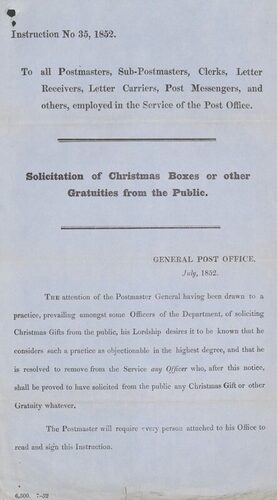|
This year, with Christmas day falling on a Sunday, we have Boxing Day yesterday and an 'extra' day off today. These days, Boxing Day is seen as the start of the sales. But today, my mind turned to how, as a child, I remember that on Boxing Day, the Post Man (and it was a man in those days), along with the Bin Men and Milk Man, coming around in their ordinary clothes and knocking on each house in our road, and my parents giving them their 'Christmas Box'. Often, they would bring their children with them to introduce to our parents as my mum would often ask about their children when she saw them, during the year. Whilst there doesn't seem to be a clear origin of this tradition, Samuel Pepys mentioned giving money to his tradesmen in his diary entry for 19th December, 1663. Thence by coach to my shoemaker’s and paid all there, and gave something to the boys’ box against Christmas.  In July 1852, Lord Hardwicke, who was Postmaster General, issued a notice to all senior staff banning ‘any officer’ from soliciting for Christmas gifts from the public. Louise Todd, Archivist at the Postal Museum, in London writes: Lord Hardwicke considered the solicitation to be an ‘oppressive tax’ that would seriously affect the conduct of Post Office officials towards those unwilling or unable to pay. It seems that he did not object to letter carriers being given Christmas gifts if this was done voluntary, but more to the active solicitation by officials. This instruction led to what one minute written many years later described as ‘agitation … throughout the kingdom.’ As you can imagine, this went down like a lead balloon with the postal workers. They turned to their MPs and anyone who they thought could influence this decision. They met with senior people in the Post Office. ‘The number of Letter Carriers of every description who participate in these gratuities is upwards of 1300; the sum divided amongst them is not less than £8000 a year. There are few that get less than £1, some £5, others £10, and in some cases more than this. In most cases, the senior men get the largest amounts as they work the best walks.’ It worked because postal workers in London, Dublin and Edinburgh were except from the ban. You can read more on the Postal Museum blog. So, how much was this Christmas box actually worth? Mr Micawber, in the 1850 published David Copperfield talks of his incoming being around twenty pounds a year. In fact, it was more likely that his income was around £30 per year. So, if a postal worker was getting a Christmas Box of around £5-£10 this was no small thing. Even a pound would be more than a week's wages.
In a time where 25% of the UK population were living below the poverty line and child labour was prevalent, such a small amount of money would have made a massive impact on a working family's life.
0 Comments
Leave a Reply. |
Why the Christmas Lace Notes?2023 has come along and this is the second year of my lace notes. All kicks off on 15th November with the first of this year's Chrismas movies. One a day, every day until Christmas. Archives
December 2023
Categories
All
|
